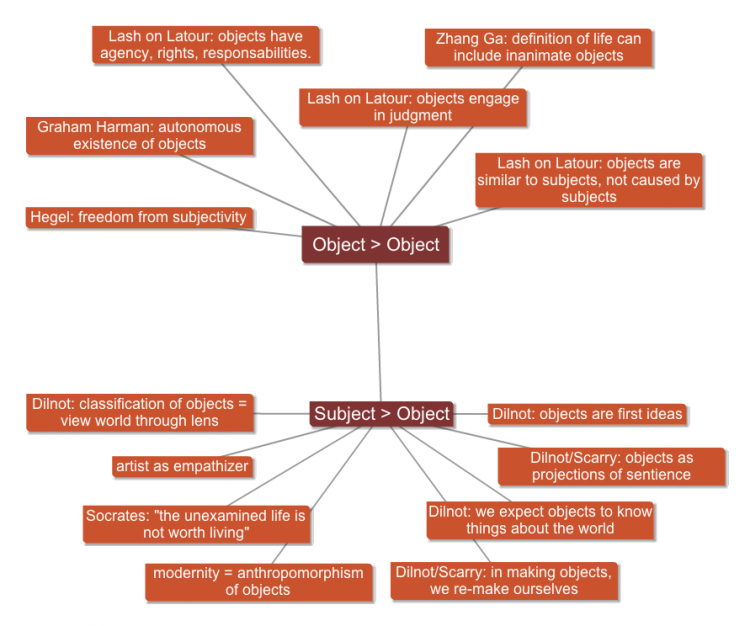I’m trying to clarify the exact philosophical ideas that I want to form the basis for my thesis. I’ve done some reading over the weekend on the thinkers that deal with the topic of subject/object relationships and have extracted the points that resonate most with me.
Here’s how I’ve divided up the ideas into each category of my thesis:
Notes:
- artist as empathizer
- Graham Harman: autonomous existence of objects (in and of themselves)
- Project of modernity was subjectivity(reaction against religion) (animate vs. inanimate, human vs. inhuman, subject vs. object) but it is being reconsidered given the new sensing capabilities of today’s objects (AI? what is “alive”?)
- Modernity has lead us to create intelligent machinery
- Hegel: freedom from subjectivity (Philosophy of Right)
- Edmund Husserl: [transcendental constitutive] phenomenology
- Zhang Ga: “the exhilarating predicament of deviating into the absurd, of treading upon the perilous waters of the unknown, of surpassing the biological limits to interweave the disparate and the irrelevant into a new tapestry of the animate together with the inanimate”
- Zhang Ga: “re-imagine life as a democratic multiplicity that embraces the human as well as the nonhuman”
- (Zhang Ga– trans-life ideas (subjectivity > objectivity) in the spirit of thinking of new forms of life and the environment. My idea is in the spirit of re-thinking subject/object to better understand nostalgia)
- Thacker in Ga: “life becomes a human-centric concern. We project the characteristics of human life onto the non-human world.” Is there a form of life that is common to everything, human/plant/animal/object?
- Socrates: “the unexamined life is not worth living”
- Clive Dilnot: classifying objects is a way of viewing the world through a particular lens
- Clive Dilnot: “To put it another way, all the objects we live with, all the things we design, live under the set of prime ideas about what an object is. Hence an object is, for us, first of all a category, a concept, an idea.”
- Clive Dilnot: we expect things to know about the world (e.g. child-proof aspirin bottle)
- Clive Dilnot: “although objects do not themselves perceive, objects are, in the essential facts of themselves, necessarily objectifications of sentient awareness.”
- Clive Dilnot: we project our human sentience onto objects; object as a projection of sentience (on Scarry)
- Clive Dilnot: in making objects, we re-make ourselves (on Elaine Scarry)
- Scott Lash: “The realm of the subject is also that of society, communities, culture and the state; the realm of the object is that of things, technologies, facts and nature;”(on Latour)
- Scott Lash: Nature (things) is universal in time and space, while society/the subject are immanent (artificially constructed by humans). (on Latour)
- Scott Lash: Objects have agency. “They have rights, responsibilities, they can judge and measure, they can mediate. Just like subjects can.” Objects are similar to subjects, not caused by subjects. (on Latour)
- Scott Lash: “This is, I think, the key to Latour’s theory and the book. He is saying that objects themselves are judges; objects themselves engage in reflexive judgement, in the weaving of morphisms. To weave a morphism is more than just to represent: it is also “to pass”, to “send”. It is – in the idiom of computer graphics artists – to “morph” something,[16] i.e. to create your morphism and then to communicate it. It is through this communication to weave a net or a network.” (on Latour)
